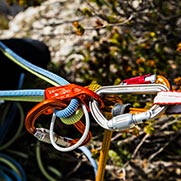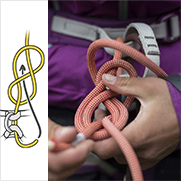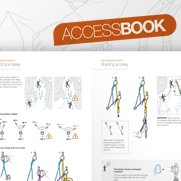COLLABORATION AND SUSTAINABILITY: OUR SUPPLIER PARTNERSHIPS
More than a third of Petzl's carbon output comes from the goods we purchase from our suppliers. Raw materials and components we purchase, the way they're processed, and the means of transport our suppliers choose also produce impacts that we're analyzing whenever possible. With this knowledge in hand, we made it a priority to work closely with our suppliers and include them in our plan for sustainable development. In these collaborative partnerships, we offer tools to help support their efforts: a carbon assessment tool, guidelines for best practices, evaluations, long-term support, and more. In addition, our purchasing team is trained in these areas.
October 12 2023
SUPPORTING OUR SUPPLIERS IN THEIR SUSTAINABLE DEVELOPMENT PLANS
Moving towards sustainability is a particularly challenging process for Petzl because it requires involvement from all of our partners (otherwise known as stakeholders) — and because we provide an increasingly wide-ranging analysis of the impact of our products and activities.
We've identified two additional important steps.
First, calculating and monitoring the carbon footprint of our entire "value chain". That means we analyze and account for all the CO2 emitted by our activity (production sites, offices, etc.), as well as by our products throughout their entire life cycle. That includes the carbon impact of the raw materials, their extraction, as well as the impact of products when they're being used (for example, the carbon impact of a battery-powered headlamp over years of use).
Secondly, we analyze different types of impact that our products have. CO2 emissions are the most commonly analyzed impact, but product life cycle analysis also studies resource consumption (fossil fuel, minerals, and metals), and impact on water and air quality (fine particles, nitrous oxide, methane).
These two types of analyses involve close collaboration with our suppliers in order to first collect the data, and then work to reduce the impacts. In other words, launching this initiative requires understanding each part of the process and integrating and collaborating with a large number of actors. That's why Petzl is committed to supporting the sustainable development efforts of our strategic suppliers by 2025. Because 38% of our carbon emissions are linked to suppliers (from products we source from them, and from the transport of materials or components), it's a commitment that is especially important to us.
A PLAN 10 YEARS IN THE MAKING
The first brick was laid for this commitment over 10 years ago. In 2010, we offered our suppliers what we call a "Code of Conduct".
The objective was to propose a certain number of criteria to meet and to start a conversation and a common culture centered around sustainable development. There are twenty-two CSR criteria organized under 4 categories: ethical leadership, human rights, health and safety, and the environment. By signing our Code of Conduct, our suppliers commit to comply with international standards set by the United Nations, including not to use forced labor or child labor, to fight against excessive work hours, and to pay fair market wages to every employee.
Since then, we've gone deeper by performing regular evaluations of our most important suppliers and working with them to identify areas of improvement based on the twenty-two criteria. In 2020, we evaluated 50 key suppliers (determined based on the type of components they supply and the purchase volume). These suppliers represented 80% of Petzl sourcing. Sixty-five suppliers were evaluated in 2021 and 2022. We then offered a minimum 3-year follow-up program in the form of self-evaluation, evaluations performed by Petzl Sourcing Teams, or an external evaluation.
OUR SOURCING TEAM: THE DRIVING FORCE
Training our internal teams is an absolutely essential step in achieving our sustainable development goals. Taking action is only possible once there is complete understanding of the stakes — and a sense of purpose for each individual.
With this in mind, we knew it was necessary to create a Sourcing Team to support our suppliers. The team was trained on assessment tools and how to properly observe and ask the right questions, allowing them to adopt a posture of support and education with an understanding and collaborative attitude.
* Members of the Sourcing Team at the Petzl Headquarters
DECARBONIZING TOGETHER
Beyond the Code of Conduct and evaluations, we wanted to provide our partners with active support in their efforts. Just as we performed a carbon assessment and life cycle analysis at Petzl, it's also important that our suppliers are able to measure their own impacts and understand where they originate. To take our support one step further, we've provided a carbon assessment tool and are currently assisting 20 strategic suppliers in conducting their own carbon assessment.
Collaboration has been an important factor in building trust and fostering strong partnerships with our suppliers. The teams involved feel a sense of accomplishment in taking meaningful steps in the transition to a more sustainable future. This approach allows us to identify solutions that are better for the environment — and it allows us to continue our work to reduce the carbon emissions and impact that our activity has on the planet.
Related News







